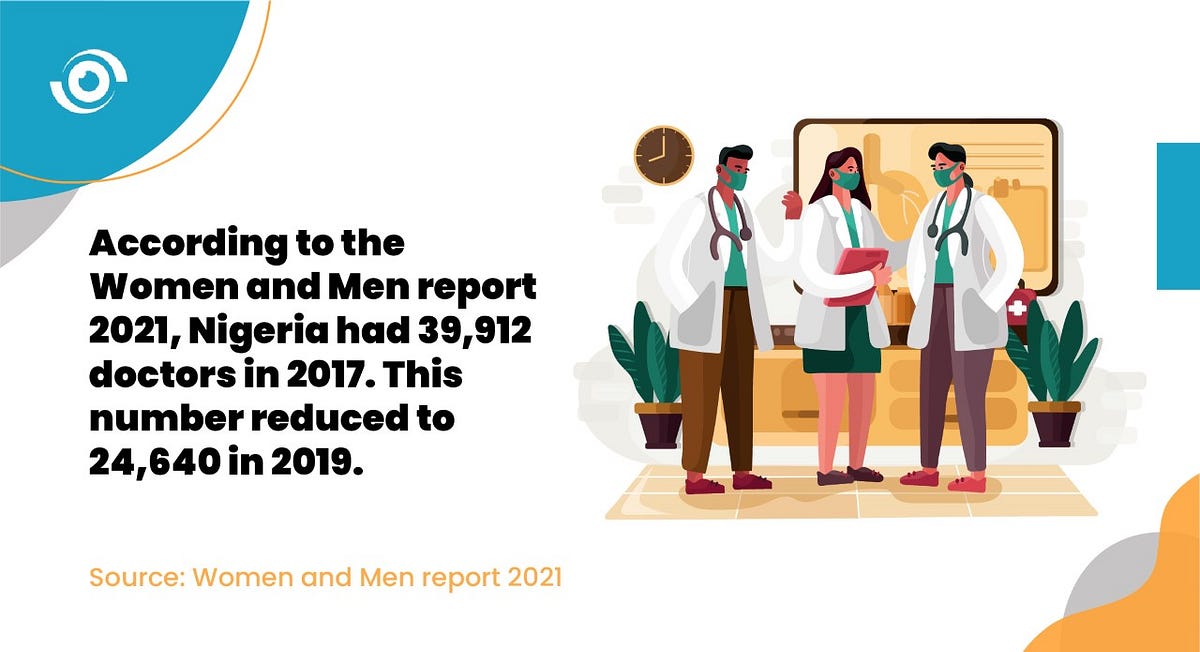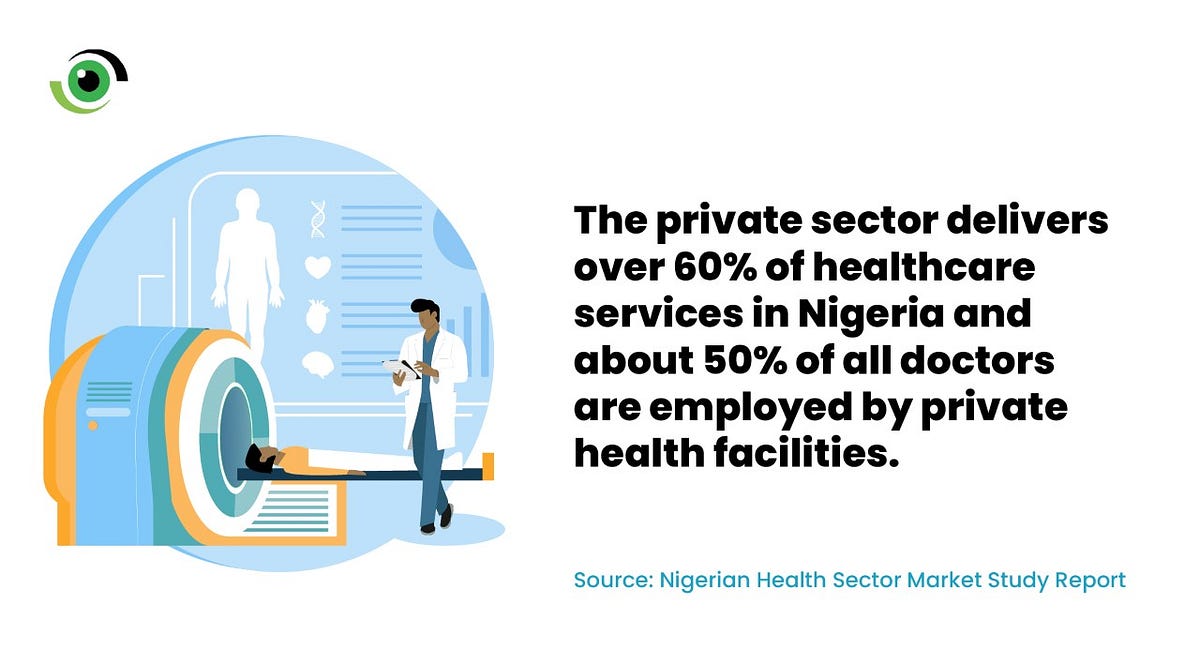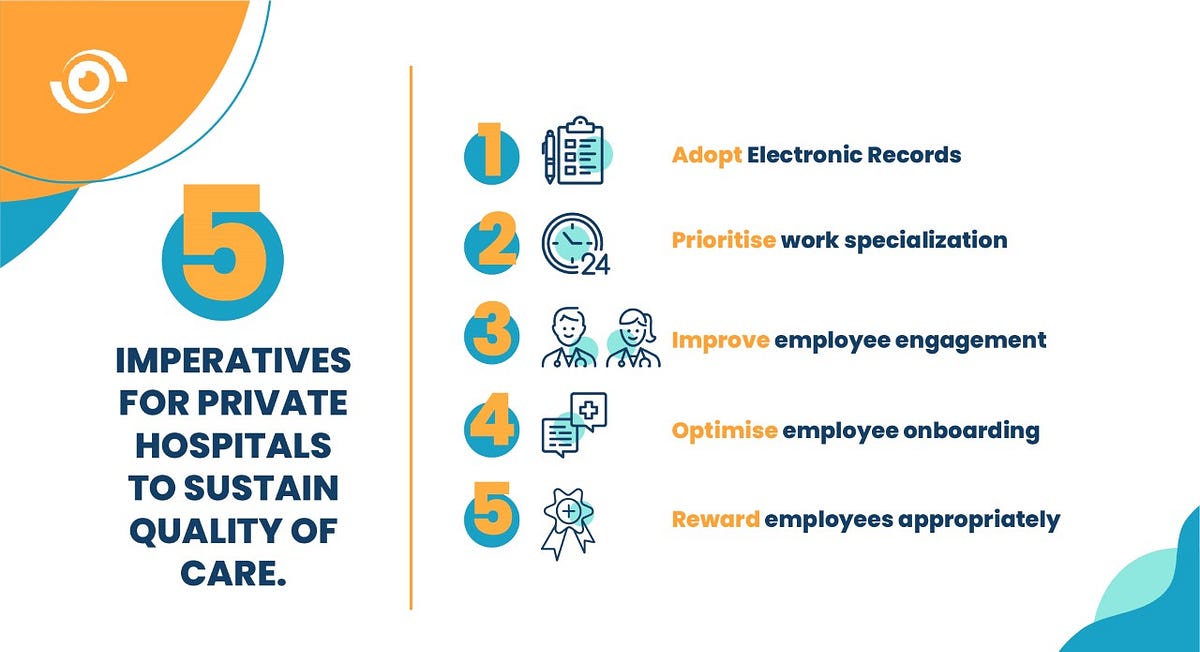By Ayoola Oladipupo (Lead Writer)
Editor’s Note: In today’s Thought Leadership Piece, Ayoola Oladipupo, an early career consultant with an interest in private sector engagement for African development, particularly in the healthcare sector, writes on the effects of the medical brain drain on private hospitals in Nigeria and shares insights on how private hospitals can sustain high quality of care.
“The way doctors are leaving the country, we just might revert back to herbalists”, I read on a typical Saturday morning social media spiral. The topic of mass migration of medical doctors and nurses from Nigeria, the ‘medical brain drain’, is rife across different segments of society. It spans informal tirades by concerned citizens on social media to claims from political leadership that the country has more than enough medical doctors. In the words of Asa, “There is fire on the mountain, but nobody seems to be on the run”.
The 2021 ‘Women and Men report’ revealed that Nigeria had 39,912 doctors in 2017. This number reduced to 24,640 in 2019. According to the General Medical Council (GMC), a registered charity in England, Wales and Scotland, there are 9,299 Nigeria trained doctors in their register. This doesn’t come as a surprise as results from a 2017 survey on the ‘Emigration of Medical Doctors’, carried out by NOIPolls and Nigeria Health Watch, revealed that the top location for Nigerian doctors seeking work opportunities abroad was the United Kingdom, followed by the United States.

A balancing act: Running a quality private hospital in Nigeria
The Nigerian health system has long been underfunded and under-equipped and this directly affects the quality of care in some public health facilities. To circumvent this challenge, private hospitals which are typically better equipped and better resourced, have become the most accessed and utilised source of healthcare in Nigeria. The private sector delivers over 60% of healthcare services and about 50% of all doctors are employed by private health facilities. The private sector, therefore, has a central role in the medical brain drain conversation.
Private health facilities are not impervious to Nigeria’s business challenges. Sporadic electricity supply and import dependency contribute to high operating costs while limited access to finance prevents hospitals from reaping economies of scale. With only about 3% of the population having health insurance, out-of-pocket spending accounts for about 75% of total healthcare spending in Nigeria. Consequently, a reduction in Nigerians’ purchasing power due to the recent economic recession has exacerbated the challenge of running a quality private hospital in Nigeria.

The medical brain drain is impacting the healthcare sector as the healthcare workforce is being reduced and so impacting the operational efficiency of private hospitals. When an employee quits, a hospital incurs direct costs due to recruitment and training costs for their replacement. The hospital also incurs indirect costs such as patient dissatisfaction due to discontinuity of care, staff dissatisfaction due to increased workload, and efficiency losses due to acclimatisation of new employees.
Despite these challenges, there are steps that private hospital management can take to sustain quality of care. Following interviews with key stakeholders, the following actions were identified as vital for private hospitals to address the medical brain drain.
Five imperatives for private hospitals to sustain quality of care
1. Adopt electronic records. Several inefficiencies along the patient journey can be mitigated by adopting electronic medical records (EMRs). By enabling more efficient storage of information, EMR systems can improve service delivery and mitigate financial losses due to coding errors. To mitigate potential challenges of adopting electronic records, during the EMR development process, management should carry out a digital skills assessment for staff and provide training where upskilling is required.
2. Prioritise work specialisation. In several private hospitals in Nigeria, work responsibilities of the health workers often extend beyond providing medical/clinical services, to include administrative and other non-medical duties. Work specialisation increases efficiency of the hospital workflow and is key to reducing cost of staff turnover. It also helps management accurately assess the performance of different departments within the hospital to improve operational efficiency.
3. Improve employee engagement. In the current climate, private hospitals cannot afford to lose employees to national competitors offering similar compensation. To improve employee engagement, hospitals should have clearly defined organisational goals and values and communicate these, in addition to creating a favourable work environment. Low work satisfaction was cited as one of the top challenges prompting medical doctors to consider moving abroad.
4. Optimise employee onboarding. To minimise catastrophic efficiency losses during the transition period of new employees, it is important for hospital management to optimise the onboarding process such that employees can easily assimilate into the hospital workflow.
Prior to resumption, hospitals could send standardised onboarding documents containing necessary information about the hospital workflow (including training resources), contracts, and forms to the new employee via email to ensure the initial days after resumption are committed to the introduction to their colleagues, the general organisational culture and job requirements.
5. Reward employees appropriately. Management should consider direct and indirect costs of turnover when determining staff compensation. While only a slight increase in basic salary may not have a significant impact, management could explore innovative benefit packages.

Next steps: Where do we go from here?
Stronger public-private partnerships (PPP) have the potential to drive increased investment in the healthcare industry. A PPP-driven health care system can help build an efficient healthcare ecosystem that will address the shortcomings of public health facilities and possibly provide better remuneration to doctors which is one of the major factors causing them to seek opportunities abroad.
The increased involvement of experienced specialists in the mass migration has led to a dearth of resources in teaching hospitals, which might have a negative impact on the education of younger healthcare workers who should benefit from the mentorship of their senior colleagues. While private hospitals should increase their operational efficiency and staff retention in the short to medium term, the onus remains on the government to create a conducive environment for healthcare workers and institutions in the long term. In addition, there could be a concerted effort to put in place policies that ensure Nigeria receives some benefit from the health workforce emigrating. The cost of training doctors in destination countries, far exceeds the government subsidised cost in Nigeria. If the necessary steps are not taken, Asa warns, “one day the river will overflow, and there’ll be nowhere for us to go, and we will run, run, wishing we had put out the fire”.



The number of registered doctors in Nigeria will not be an accurate figure because many of these doctors who have left the country still maintain their registration with the regulatory authorities in Nigeria even though they are in the diaspora.
The reason for their flight out of the country is beyond the remit of strong PPP, it includes the insecurity, poor infrastructure, weak educational system and a host of others.
The solutions will require a whole system approach.